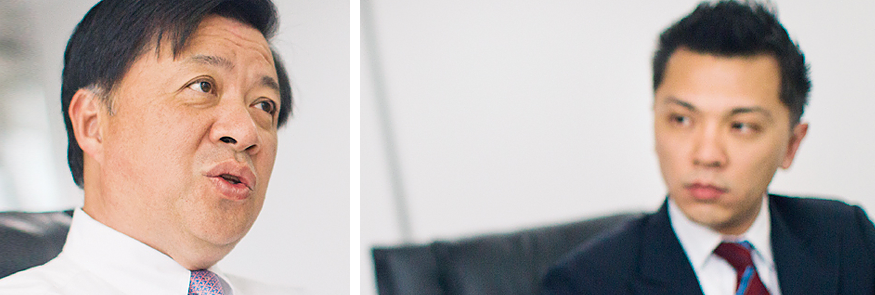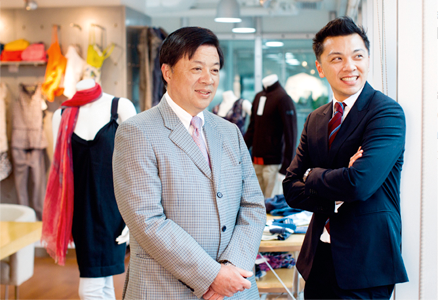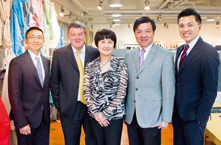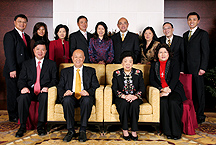Interview with Henry and Sunny Tan, Luen Thai Group
“We believe we are stronger as a business and happier being together as family. These are the fundamentals of our parents’ culture and value system, and this is our inheritance.”

1
Henry and Sunny Tan are not only brothers. They are also Deputy Chairman, Luen Thai Group, and CFO and Executive Director, Luen Thai Holdings Ltd, respectively. Together with three other siblings, they form the executive core of a conglomerate that has revenues of approximately US $1.2 billion and a flagship garment business that produces over 74 million garment pieces annually.
LUEN THAI has sales and design offices and logistics stations in key cities around the world. The company possesses production capability in countries that offer maximum manufacturing flexibility: China, the Philippines, Indonesia, India and Bangladesh. Though both Henry and Sunny Tan frequently travel to various parts of the world, they were able to meet with The Focus at the company’s Hong Kong corporate headquarters.
The Focus: Luen Thai’s transition from a strictly family-owned company to a publicly traded and family-controlled company began only a decade ago. With five siblings currently in core executive positions within the company, how was that transition managed from your father to your generation?
Henry Tan: We began to talk about transition almost ten years ago. I was invited by HSBC to a London conference, and then to a second one in Geneva on family governance and how wealth is moved from one generation to another.
Ten years ago in Asia, there was not a great deal of information on this. My father was 70 years old at the time and there are six of us in the family. The meetings in London and Geneva allowed us to learn the successful experiences of other family businesses and how they dealt with issues that all family businesses face.
From the very start, we had solid professional guidance. At the time, I put the question to my dad: “This is your decision. The brothers can divide the company along business lines and split up family wealth, each of us on his own. Or rather than splitting up the business, we can split the shareholdings in the company.” This was the first decision my dad had to make, with the agreement of the brothers who would really be his partners in this. Our conclusion was that the family business would remain as a group and that the brothers would share the overall business. There is a Chinese saying: it’s much easier to break a pair of chopsticks than to break a bunch. As a family, we can be much stronger being together as one big family, provided that we share the same dream and same value system.
The Focus: What did you see as the advantages and disadvantages of operating as a group?
Sunny Tan: One important advantage is that the ups and downs in different businesses and in different locations around the world where we operate would be better balanced. Of course, one disadvantage is that you have a lot more people to manage, and you have to be able to manage them properly.
Henry Tan: The basic structural issue is the same for all family businesses – the relationship among the owners, family, and business, how these three interest groups interact, and how their different needs and aspirations are managed. The key is a proper governance structure which can balance the overlapping and competing interests of the three.
The six of us grew up together under the same roof. This makes it easier for us to compromise. But moving to the next generation, my sons and their cousins… First of all, there are more people involved, who did not necessarily grow up in the same household, or even the same sort of household. So the problem is: how do you structure for the second generation and plan for the third generation? What is the solution in terms of governance structure that is best for our particular family circumstances?
“The key is establishing a proper governance structure.” — Henry Tan
The Focus: You have developed and achieved aggressive strategic goals for the company. As a family-controlled business, how did you accomplish this with regard to your governance structure?
Henry Tan: Normally my dad and the brothers sit down every three months to look at business performance, and define what we want to do based on current circumstances. We also meet annually to discuss strategic goals and how we see the business developing in the immediate year, and from a three or five-year perspective, in order to establish priorities. We also have an investment committee which sets up investment guidelines, and vets and approves proposed investments.
At the same time, the family also meets as a family, not as a business. We have an annual Family Assembly to communicate on the family business with non-business family members like the in-laws or adults working outside. We also want everyone to understand what benefits they are receiving – funding for education, medical care, even an annual family vacation, and to have proper expectations. Misunderstandings or lack of information can create problems.
In addition, it is very important to communicate core-family values, what the family stands for. My father established the core-family values, and it is my job to uphold them and see that everybody understands them. All our decisions must be joint decisions. If you have core-family values and you put family interests ahead of personal or branch interests, joint decisions will be much easier to achieve.
The crux is, we believe we are stronger as a business and are happier being together as family. These are the fundamentals of our parents’ culture and value system, and this is our inheritance.
“It is very important to communicate core-family values and what the family stands for.” — Henry Tan
The Focus: If establishing core-family values is critically important to family business success, then do you think that being a family company has given you specific advantages in terms of pursuing the company’s strategic goals?
Henry Tan: Family business has its pros and cons. A family member joining the business is a touchy issue. You really need to strike a balance between the benefits of a family member running the business, and the benefits of a strong professional team. A family member is expected to devote more time and make more sacrifices to the company. It is hard if not unreasonable to ask non-family professional managers to do the same. However in terms of rewards and career progression, it is crucial that family members and the professional team are treated equally within the company structure.
Sunny Tan: The ideal balance between family members and a strong professional team is a very important part of corporate governance. Top professional talents want to do things right. They want to see the pattern, the predictability of how decisions are made. If the decision-making process is not clear, a family business risks being perceived as lacking a well-established system of corporate governance – and will have a difficult time in attracting talented people. We have devoted a great deal of effort to putting policies and procedures in place so that top talent can see the transparency in decision-making processes and feel comfortable with joining us.
The Focus: Related to this issue, how does the Board of Directors function? With regard to its composition, what is the Board dynamics in terms of the decision-making process?
Henry Tan: I must say that the publicly listed portion, Luen Thai Holdings (LTH), has better governance because it is answerable not only to the family, but also to the public shareholders.
30 to 40 percent of the LTH board is independent. They not only protect the minority shareholders’ interests, but also provide perspectives, professionalism and experience outside of the company business. Independent directors with a non-garment background give us the benefit of an alternative view. They help us look outside the box, which is very important, because sometimes we are just too much inside the business. We value this input very much.
The Focus: How do you choose the independent directors to sit on the Board?
Henry Tan: We look for people across a variety of industries such as finance, banking and manufacturing. Presently we do not have as many independent directors as a larger publicly listed company probably does. In the long term we hope that our board eventually would have more independent and non-family directors than family members.
The Focus: With regard to attracting professional people from outside into a family business, what are the qualities that Luen Thai looks for in managerial hires and in potential CEOs of portfolio companies?
Henry Tan: First, we do groom people from within the company. Promoting from inside is an easier task because we know these individuals and their historical performance. We also recruit senior management from outside, but only if we lack internal talent, whether that is family or not. We actually are able to recruit very good middle management talent, and groom them into senior positions, but recruiting senior management from outside is somewhat of a challenge. There is not an abundance of top talent, especially on the manufacturing side of the industry. In terms of qualities, we look for technical and managerial competencies and at the same time, integrity, drive and passion. Of course, we need to structure a proper incentive system for the individuals to share the monetary success of the business ventures.
Over the years we have also looked for equity partners. We invest in their companies and they continue to run them. We respect each other and run a good business together. This partnership model has worked very well for us. We have been trying to learn more from VC and the private equity world.
“We are very selective in recruiting from the family. We want only the best for the business.” — Henry Tan
The Focus: How do you get family members involved in the business? How easy or difficult is it?
Henry Tan: It is very challenging to find family members willing to join the garment-manufacturing business. It is not the most high-flying industry. On the other hand we are very selective in recruiting from the family. We want only the best for the business. However, nowadays it is difficult to attract the best who are also willing to stay five or six days a week in a manufacturing base in China. Getting out of school, I did not have many alternatives.
I joined the family business. Most of our younger generation members are well educated; Sunny and my son, for example, are both Stanford/Ivy League graduates. They can get very good jobs for instance in the financial sector which offers salaries and compensation that is difficult for the garment industry to match.
The reality is, we face a real issue in providing competitive financial incentives for the third generation. Within the company structure, the compensation package must be consistent across the board and adhere to policies and market norms. This means our third generation members often take pay cuts of 40, 50 or 60 percent when they joined the family business. We are looking at various possibilities – for example is it feasible to have incentives and family dividend policy that could lead to better rewards for the family’s high performers in family business even if they personally do not hold shares? We need to put on our thinking hats.
“We have put a lot of effort into developing the family culture and working on the younger generation.” — Sunny Tan

Sunny Tan: Over the past five or six years, we also have put a lot of effort into developing the family culture and working on the younger generation. These are the people who will have the passion and who will want this organization to be successful more than anyone else.
At the same time, having the best education is only part of the equation: the family has been investing in executive coaching and external education to groom our next generation. From time to time, we try to put them into new roles and assigned “mentors” to them to allow them freedom to learn how to run business. To a certain extent, you cannot teach how to run a business but to learn from experience.
Family business is often more long-term oriented and a little more conservative. It is not for everyone, both for family and non-family executives. The right fit for the company is someone who appreciates being part of building a success story with the family, having a longer horizon, and ensuring that we are a very close working unit. Values and personality are also part of the equation.
Henry Tan: The right fit is particularly important in certain areas which need a family member involved. An example is our businesses in Guam and Saipan – we are one of the largest companies in Micronesia. My younger brother and my brother-in-law are managing them. They are now both in their 50s. I have been trying to encourage at least one third generation member to relocate to Guam. I told them Guam is a very livable place. True, it is not Hong Kong, but it has many advantages. We have to figure out how to incentivize our third generation, and are working hard to find the right personality who will fit with the island culture.
The Focus: Since we are discussing family, can we talk about how your family governance structure is set up and how it functions? Do you have a family council and a family assembly?
Sunny Tan: We have a Family Council that meets quarterly, and for convenience, at around the same time as our business meetings. We also have three very active committees, all under the Family Council, plus one we plan to establish shortly. Each committee is “seated” by four to six second and third generation family members. We are seeing much better participation from the third generation now than when we first started. I think they are finding that committee work is not boring and the rules and benefits being worked out by the committees will affect them, their cousins, and their sons and daughters. The Family Council wants to create a pleasant environment for them to have the opportunity to work and contribute together as a family.
The “Education and Career Committee” defines the subsidies the family gives to kids and young adults and provides guidance throughout their educational life – which in Hong Kong can start as early as six months! The “Health and Medical Committee” helps take care of our parents and addresses family health care needs. We even brought in a dietician a couple of months ago to establish healthy diet guidelines. The “Recreation Committee” manages our fun. Every Sunday, the whole family meets for dinner, usually with 20 or more people. The family branches rotate as host. A lot of effort goes into these dinners, such as special boat trips, barbecues, golf outings and whatever the hosting families come up with to make the gatherings fun. Of course, not to mention our Family Assembly, once a year family trip, great fun!
The Focus: We know that you have established a family office – a common component of family business structures in the U.S. and Europe, but less common in other areas of the global economy. What was the thinking behind establishing The Tan Family Office and how has the idea evolved?
Sunny Tan: Connie Hui – who is from outside the family – heads the Tan Family Office. We had wanted to establish the family governance structure a number of years ago, but it was slow to take shape. We needed someone to take ownership. We knew that Connie, with Henry’s supervision, could get it done. We also hired third-party professionals, a consultant who specialized in corporate governance, to support the project and help us write the governance documents.
For me, the objective of a family governance structure is really about building governance, relationships, trust and intimacy among family members. Otherwise, as Henry said, as the family grows bigger and family members no longer grow up under the same roof, you lose that intimacy. Essentially we have to nurture the identification of being a Tan. It is not about business. It is about the family.
Henry Tan: Before Connie joined us, we did what Sunny has described, but in a much less structured way. We also lacked proper documentation.
Over the last two-and-a-half years, Connie has helped us clarify a lot of the grey areas in the original informal set-up. We now have a written Family Constitution that acts as the guide for the Family Council and the decision-making process, and formal policies and procedures, e.g. for benefits and how a family member can join the family business. Connie also handles the committees and ensures that they meet regularly, three to four times a year, and function properly. The Committees and
Family Office have become a communication platform where family members go to ask questions as well as give input. Coupled with the increased participation from the third generation, there is now a lot more transparency in how the family makes decisions and what everyone can expect, especially about benefits.
The Focus: You have a very active charitable foundation and the foundation offices are run mainly by family members. How does the foundation’s giving reflect the values and vision of the company and its founder?
Henry Tan: We try to devote ten percent of our business profits to charitable efforts, which often go through my dad. I am working very hard with Connie to see how the giving can be more structured and accountability can be created for what we want to achieve. This area is still a “work in progress” and, I must admit, an incomplete portion of the family setup.
However, we do have a number of very successful campaigns, especially in Micronesia, partly because it is a small community and the company is one of the largest in the region. We are involved in almost everything there, from giving to education to organizing walk-a-thons for the American Cancer Society. We arranged and sponsored a free concert in Saipan which 16 percent of the entire population attended. In the Philippines, we handed out food to flood victims. We did not just donate money, we actually bought food and handed it out ourselves.
“We know that our past success does not guarantee that we will be successful in the future.” — Sunny Tan
The Focus: What do you see as the major challenges ahead for Luen Thai and how do you balance a sense of tradition in both your corporate and family values with a need to innovate and to adapt in a very rapidly changing competitive environment?
Henry Tan: The apparel business is very, very competitive. We run it very deep and narrow, with a lean structure so as to manufacture and deliver apparel and accessories at the lowest possible cost and to be able to deliver to consumers at the end of the supply chain. Immediate challenges include European and American economies, which are not in the best of shape, with cotton prices going through the roof and the Renminbi and wages all rising too. We are navigating through these challenges, aiming to become a stronger company in the years to come.
We look at our Guam and Saipan businesses in a totally different way. Geographically, the islands and ocean of Micronesia span an area as large as the United States. But the population is only some hundred thousand. Here we run our business wide and shallow to grow horizontally into different businesses. My personal belief is that Guam and Saipan offer a lot of opportunities. Guam is the closest American territory to Asia and China, at the interface of the world’s largest and second-largest economies. Moreover, the U.S. is investing US$15 to 20 billion for a new Marine Corps base on Guam in 2014. This should fuel economic and demographic growth in the region. At the same time, Chinese are getting much richer and they are eager to invest overseas. Many people may not be aware that Guam and Saipan are the closest tropical vacation destinations for northern Chinese.
We also see a lot of charitable opportunities to express our family values. In the smaller island communities, we want to take a broad approach, whereas in Hong Kong and China we want to take a more focused approach in our industry or in a particular area of my father’s interest, such as education.
Sunny Tan: I would add two more areas of challenges, not immediately but a little further out. Definitely Henry’s succession is something we will have to face in the next five to ten years. Also, where will our next generation of executives come from? It takes time to groom people.
The other area has to do with external factors. In the next ten years we will see a fundamentally different global economy from the past 20 years. We know that China’s economy is on the rise and the purchasing power of its middle class is growing. How can we make this work to our advantage? Henry has been assessing the risks ahead to get ourselves ready to interact with this new environment. We know that our past success does not guarantee that we will be successful in the future.

Henry and Sunny Tan together with Connie Hui of the Tan Family Office were interviewed by Bill Henderson and Siddique Salleh (left), both formerly Egon Zehnder, Hong Kong.
Luen Thai Group and the Tan family

Founded by Dr. Tan Siu Lin in 1965, the Luen Thai Group operates multiple industries in China, Micronesia, the United States, and the Asia-Pacific region with approximately 40,000 employees. Dr Tan is the Chairman of the board. Five siblings and an in-law form the executive core of the group: Henry Tan (57), Deputy Chairman of the Luen Thai Group; Willie Tan (55), CEO of Luen Thai Enterprises Ltd., the holding company of the family’s private businesses; Samuel Chou (54), COO and President of Luen Thai Fishing Venture Ltd.; Raymond Tan (50), President of Luen Thai International Group Ltd.; Jerry Tan (50), President of Tan Holdings Corporation and CEO of CTSI Logistics; and Sunny Tan (37), CFO and Executive Director of Luen Thai Holdings Ltd.
The Group’s flagship, Luen Thai Holdings Ltd., is a global leader in providing end-to-end apparel and consumer goods services and has been listed on the Hong Kong stock exchange since 2004. Headquartered in Hong Kong, the company has grown from a manufacturing company into a group of companies that supplies global brands and retailers around the world - including adidas, Dillard’s, Esprit, Limited Brands, Polo Ralph Lauren, Targus, and UNIQLO.
The Group’s private arm spans business interests in hotels and tourism, fishing, insurance, air and ocean cargo services, real estate, footwear, health care services, wholesale distribution and retail.
Henry and Sunny Tan and their brothers, fully aware that they “think differently,” attribute their ability to compromise on strategic business decisions to having grown up in the same household, with a shared sense of family culture and values.
PHOTOS: PAUL HILTON





